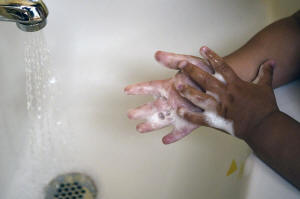It's sick season. Here's how to protect yourself from norovirus,
COVID-19, flu and RSV
 Send a link to a friend
Send a link to a friend
 [January 13, 2025]
The Associated Press [January 13, 2025]
The Associated Press
In the winter months, it seems few are safe from some kind of illness —
flu, COVID-19, norovirus, colds.
While many of the germs that cause this misery can circulate throughout
the year, scientists think that the winter surge of flu and cold
activity may be because we spend more time indoors and the cold, dry air
may weaken our defenses.
But knowing what these bugs are and how they spread can help. While it
may be difficult to make it through the season totally unscathed, there
are some things you can do to protect yourself from these respiratory
and stomach viruses.
How do I know whether I have the cold, the flu, COVID-19 or something
else?
Some symptoms are hard to distinguish among illnesses, especially with
respiratory viruses. Others are unmistakable.
— Norovirus is a foodborne illness that can spread through water and
contaminated surfaces and can cause vomiting, diarrhea, nausea and
stomach pain for about one to three days.
— The common cold can be caused by several different types of viruses
and can cause a runny nose, congestion, cough, sneezing, sore throat,
headaches, body aches or low fever for less than a week.
— The flu, caused by influenza viruses that are always changing, leads
to fever, chills, cough, sore throat, runny nose, body aches, headaches
and feeling tired. Flu symptoms tend to hit more quickly than cold
symptoms, and can last anywhere from a few days to two weeks.
— COVID-19 can cause fever, chills, cough, short of breath, sore throat,
congestion, loss of smell or taste, fatigue, aches, headache, nausea, or
vomiting for several days.
— RSV can cause a runny nose, congestion, coughing, sneezing, wheezing,
fever and a loss of appetite for a week or two.

One way to protect yourself from all viruses: Wash your hands
Seriously. Rigorous and frequent handwashing — with soap! — is crucial
to reduce the spread of norovirus, colds, flu and COVID-19.
This is especially true after using the bathroom and eating or preparing
food, the U.S. Centers for Disease Control and Prevention says.
Don't speed through it, either. Count to 20, slowly, while you scrub
away.
If you don't have access to soap and water, try a hand sanitizer with at
least 60% alcohol — though that isn't enough to wipe out norovirus.
Cleaning surfaces can wipe out viruses
If norovirus has found you, you'll want to immediately clean surfaces
that came in contact with contaminated food or bodily fluids. The CDC
recommends disinfecting things with a chlorine bleach solution or one of
the products listed on this Environmental Protection Agency website.
Don't forget to wash any clothing that came in contact with vomit or
feces — use hot water and detergent. Then, wash your hands. Again.
With colds and flu, it's best to regularly clean surfaces that you come
into a lot of contact with. Think doorknobs, light switches,
countertops, beloved toys, cellphones.
[to top of second column]
|

A child washes her hands at a day care center in Connecticut on
Thursday Aug. 27, 2020. (AP Photo/Jessica Hill, File)
 Use household cleaning products that
contain soap or detergent, and follow it up with a sanitizer. The
CDC has more tips on how to clean.
COVID-19 generally spreads through the air from droplets and
particles, and the CDC says the risk of getting the virus from a
contaminated surface is low.
Keeping your hands off your face can keep viruses out
Viruses can spread through talking, coughing and sneezing, so cover
your mouth with a tissue if you feel a tickle in your throat or your
nose. Then, wash your hands. Again.
Also, even if you're not sick, consider masking in crowded areas
with an N95 or medical-grade mask to protect yourself from
respiratory viruses.
Don't touch your face: If you have a germ or virus on your unwashed
hands — respiratory or norovirus — and touch your face, eyes or
nose, it can get into your mucus membranes and, voila!, you're sick!
Consider a vaccine (if there is one)
Updated COVID-19 vaccines are available, as well as annual flu shots
for people 6 months and older. For those 60 and older or for people
who are pregnant, you may want to get the RSV vaccine.
But there is no vaccine for norovirus or the common cold.
Another way to keep your defenses against viruses up: Rest
Your immune system may not work as well if you're sleep-deprived,
stressed out or dehydrated. So don't grind yourself into the ground
if you can help it. Rest. Sleep. Drink water.
If you are sick, stay at home
If you do get sick, prompt testing can help determine whether you
have COVID-19 or influenza. That’s important to see if you need one
of the medicines that can help prevent severe illness: Paxlovid for
COVID-19 and Tamiflu for flu.
Above all, if you're symptomatic, stay at home to keep from getting
others sick.
To treat a cold, flu or COVID-19, rest and drink fluids. You can
take pain relievers to lower a fever or help with an achy body.
Humidifiers can help with symptoms, too.
There's no medication for norovirus. Instead, you'll need to
rehydrate as much as possible with water and other liquids. Seek
help if you are dehydrated and notice you have a dry mouth and
throat, aren't urinating as much or feel dizzy when you're standing
up.
___
AP Medical Writer Carla K. Johnson contributed to this report.
___
The Associated Press Health and Science Department receives support
from the Howard Hughes Medical Institute’s Science and Educational
Media Group and the Robert Wood Johnson Foundation. The AP is solely
responsible for all content.
All contents © copyright 2024 Associated Press. All rights reserved |